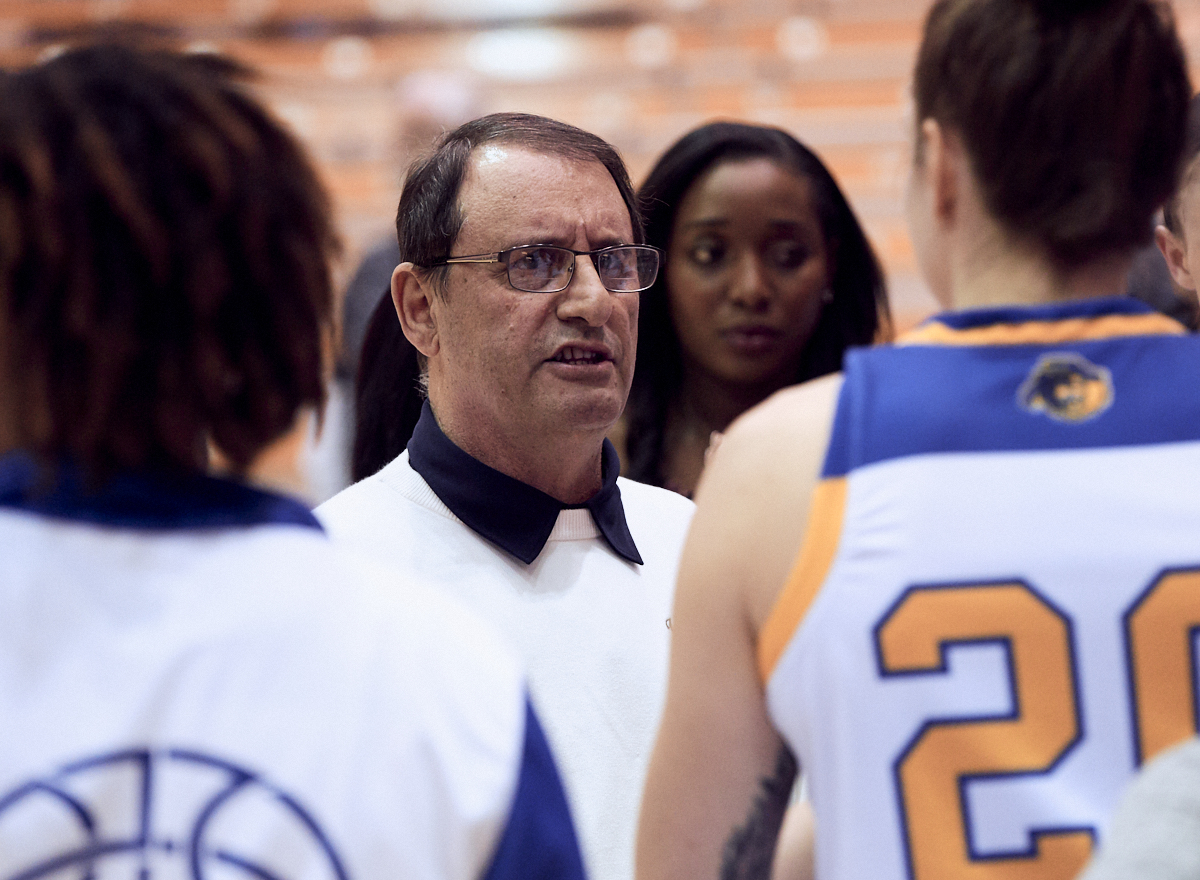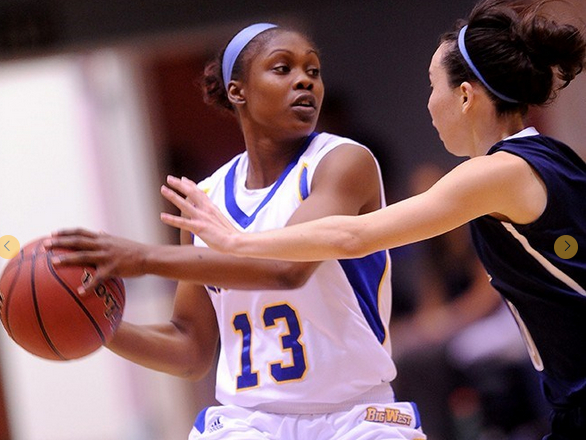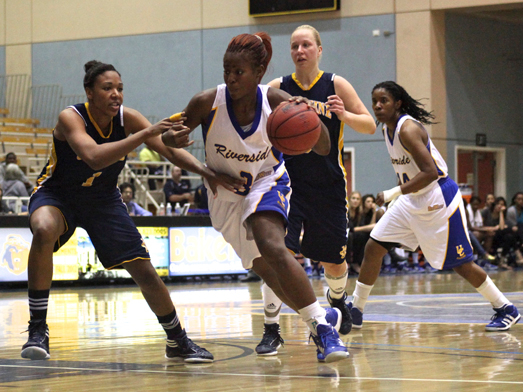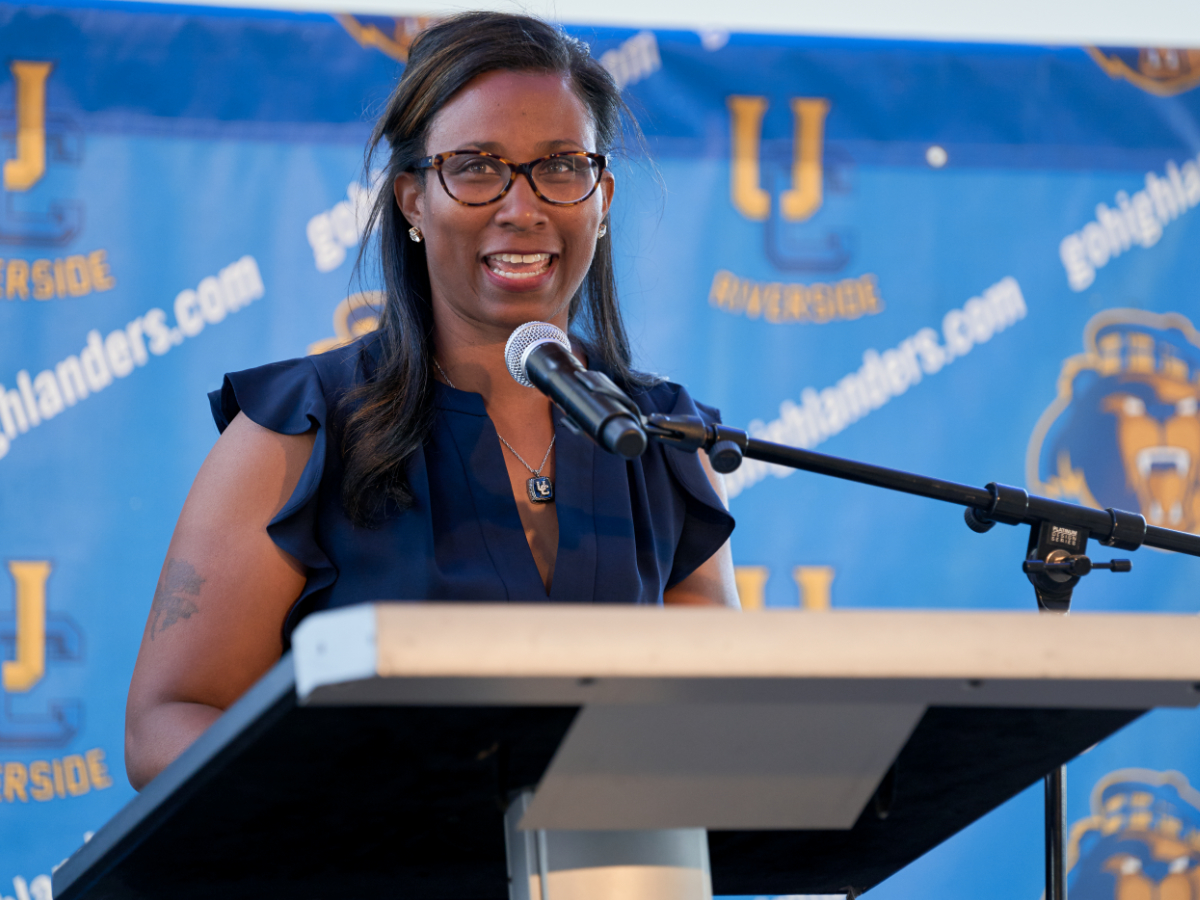This article was contributed to by Jordan Hom.

When UC Riverside’s women’s basketball assistant coach Giuliana Mendiola was informed on Monday, July 22 that her contract would not be renewed for the 2019-2020 season, it sent shockwaves throughout the women’s basketball program and their alumni.
Although the official reason for why Mendiola will not be brought back remains unknown, former players with knowledge of the situation have heard it was due to “poor coaching skills” and, more specifically, “a month of bad coaching. “That doesn’t make any sense,” said a former women’s basketball player from the class of 2017. “She was there for seven years.”
The decision to dismiss Mendiola was made during an outside independent investigation regarding alleged unethical behavior of Head Coach John Margaritis. As a result of the investigation, Margiritis was initially going to be suspended for 20 days without pay for being in violation of a university policy. While the athletics department did not provide details on the specific violation, multiple sources with knowledge of the investigation said that it was focused on the alleged mental and verbal abuse of student-athletes by Margaritis. The former players also said they didn’t understand why they weren’t asked to participate in the investigation.
Margaritis’ 20-day suspension will include practices and games. The start date of the suspension has not yet been determined.
The former players felt Mendiola was actually fired because of how vocal she was during the investigation into Margaritis’ alleged mistreatment of his players. “She got fired because she doesn’t submit to him like everybody else would,” said Dynese Adams, a former women’s basketball player who was with the program from 2010-2015. “I don’t think she’s wrong for that. You stand up for what you believe in … At the end of the day, yes we’re here to play basketball, but we’re also here to grow as women and I think she helps, and has helped, a lot of women grow as not just basketball players but as women.”
Mendiola had been associated with the program since 2011 and established deep connections with her players that extended beyond the sidelines. The unexpected “firing” of Mendiola, which many current and former players felt was unfair, led to the creation of a petition on change.org that currently has over 950 signatures. The petition states that Mendiola was fired, but a spokesperson for UCR Athletics clarified that Coach Mendiola’s “contract had expired and was not renewed,” in response to an inquiry from The Highlander.
The creators of the petition, as well as many others, have demanded more transparency on the official reason why Mendiola was dismissed.
Many former players and others familiar with the team’s dynamics believe Mendiola’s absence will have a negative impact on the team heading into the 2019-20 season. “I think the girls are going to suffer,” a former employee with an understanding of the team dynamic told The Highlander. “Both current and future athletes on that team are going to suffer by not having someone like her that’s willing to stand up for them around.”
“I think she literally just wanted the best for us,” said Kiara Harewood, another former women’s basketball player who was in the program from 2011-2014. “On the court and off the court. So on the court she wanted to see us succeed like nobody else, she was our biggest supporter and off the court she also would tell you the truth and speak to you like you’re an adult.”
“She was like that light, she was like that breathe of fresh air … and she honestly helped get me through,” said Adams.
Coach Mendiola issued the following statement via email in regards to her sudden dismissal and the result of the investigation:
“The job of a coach goes beyond winning and losing. The job of a coach is to lead, teach, challenge, inspire, and empower impressionable young student-athletes. Head Coach John Margaritis has been at the helm of the UC Riverside Women’s Basketball program for 15 years. For seven years I not only witnessed the toxic, demeaning, manipulative, threatening, hostile culture that he created with his verbal and emotional abuse, I am a victim of it as well.
UCR Athletic Director Tamica Smith-Jones had the opportunity to change the misogynistic culture Coach Margaritis created and she chose not to. AD Jones came to me shortly after the current student-athletes complained of Coach Margaritis’ mistreatment in December, and told me of her plans to fire Coach Margaritis and name me Interim Head Coach. She met with the team in May and promised them the same.
And without explanation, AD Jones and UC Riverside chose to abruptly end my tenure with the team by not renewing my contract and instead chose to give more power to the abuser which is a complete disservice to the student-athletes, the University and the community of Riverside. When Coach Margaritis was finally punished for the grave mistreatment of student-athletes, he was suspended for just 20 days. Twenty days of unpaid suspension for 15 years of abuse, is not justice.
Not only was I harassed and verbally abused by this man, I am now being retaliated against for standing up for what is right. I am a woman of high moral standards. I am a woman of principle. And after years of earning the love and respect of the program, the University, and the community, it is me, not him, who is now forced to defend my character, reputation, and my future.
Female student athletes should not have to endure abuse by their coaches. Female coaches should not have to experience any kind of harassment, threats, emotional abuse and discrimination in the workplace.
To be silent and complicit in allowing this kind of behavior is to condone it. When you condone it, you now too become the problem rather than the solution.
And I refuse to be silenced.”
The nature and firing of Mendiola is a microcosm of what the players described as Margaritis’ “tyrannical” tenure.

Dynese Adams joined the UCR women’s basketball program in 2010 as a wide-eyed 18-year-old who was both excited and terrified to play on the next level. “In high school, you always hear about the next level. It’s so much more intense and this coach is intense,” Adams said in an interview over the phone.
After talking with Margaritis, Adams and her head coach decided she should redshirt her first year. However, despite the decision to forego collegiate competition for a year, Adams found herself at the center of attention at the teams’ then-annual Midnight Madness event, a pep rally to celebrate the upcoming season. In UCR’s Midnight Madness event the men’s basketball team would host a slam dunk contest while the women’s team hosted a three-point shootout.
Adams was only in Riverside for summer workouts and had hardly practiced with the team, much less experienced the adrenaline that comes with playing in front of the home crowd, yet she was inserted into the three-point shootout by her new head coach and struggled. “I don’t even think I made a shot,” Adams recalled.
According to Adams, Margaritis stopped practice the following day to berate her and another teammate who also struggled in the shootout in front of the entire team. “He’s just like ‘I don’t know if you can play at this level, that was embarrassing and I could tell before you even started that you were going to miss your shots,’” said Adams, “and for (Margaritis) to tell me (he doesn’t) think I can play at this level and that also (he) thinks (he) made a mistake in recruiting me?”
“As a freshman I was like maybe this is how it goes,” Adams said.
In 2013, Adams’ fourth year in the program, she found out she was pregnant, and unable to play basketball for the foreseeable future.
After having her baby on March 29 via cesarean section, Margaritis came to the hospital to visit Adams and check on her progress. According to Adams, Margiritis told her that the key to coming back from a c-section is to get the muscles “down there” worked out and moving. Adams remembers Margaritis saying that doctors usually say it takes six weeks to come back from a c-section, but she could make it back in two to four weeks because she was strong.
“I felt really pressured,” Adams said. “(Margaritis) came to the hospital after my son was born and he was pretending to be concerned, he even held my son … I have an incision as large as a f—— pencil in my stomach and you’re worried about when I’m getting back on the court?”
Many who go into the UCR women’s basketball program on a scholarship are initially elated at the opportunity to play at the college level. However, that feeling quickly disappears as they come to the realization of the situation they are entering.
Multiple former players told The Highlander that Margaritis would constantly threaten to take scholarships away from players, which took a toll on their mental health. “Yes (Margaritis) threatened me. I don’t know who he did not threaten to be honest with you,” Harewood said. “I’m pretty sure almost everyone was threatened with that and it puts you in this like psychological box of ‘I can’t do anything.’”
According to multiple sources, this added a strong and constant pressure to quietly submit to Margaritis’ demands or risk losing everything they had worked for. “Can you imagine you’re working your entire life up to this moment to get a scholarship to play Division I basketball and then you get there, and the coach is basically holding that over your head? Telling you that you’re going to lose your scholarship if you don’t comply with what he wants?” Harewood said.
Numerous former players reported that Margaritis would act as though he was directly paying for players’ education, food and living arrangements and used that as leverage to coax them into submission.
According to Inara Nyingifa, who was a forward for the Highlanders from 2013-2018, Margaritis would also use this leverage to pressure players to play through injuries. “He sees it as ‘I’m the one who paid for your scholarship,’” Nyingifa said. “‘You need to play. Do what I say. It doesn’t matter if your leg is going to fall off, hop on your other leg and make the shot.’”
Margaritis actively discouraged student-athletes from telling the trainers when they were hurt, or specifically when they would hit their head, former players told The Highlander. “He used to get mad at us if we told the trainer that we hit our head,” Adams said. “You know how serious concussions are? We would literally be in fear of telling the trainer that we bumped our head … (Margaritis) would tell us we were weak. ‘It’s just a headache, take some Tylenol and get back on the court.’”

Former women’s basketball player Jessica Ogunnorin was a forward in the women’s basketball program from 2010-2012 and suffered severe trauma as a result of the pressure Margaritis placed on players to play through injuries and ignore hits to the head.
Ogunnorin came to the United States for more than just basketball: she was looking to escape a past in Greece where she experienced sexual harassment and an absent father who left her family before her first birthday. She mainly felt comfortable committing to UCR because she believed Margaritis, who is also Greek, would help with her transition into American culture. However, her comfort-level with Margaritis and the program quickly spiraled downward.
Ogunnorin remembers that during her first year Margaritis would bring up intimate details of her past during practice after she made mistakes. Ogunnorin said Margaritis would often chastise her in Greek, meaning no one else could understand what he was saying.
“He approaches you and tries to learn a lot about you. He tries to build that trust,” Ogunnorin said of Margaritis. “He’d say ‘that’s why your dad left you or it looks like you want to go back to the situation at home’ … he would mention my sexual harassment experience.”
After redshirting her first season due to injury, Ogunnorin had doubts about returning to the program, but ultimately decided to return for her second season. Following her sophomore season Ogunnorin says Margaritis did not allow her to go home over the summer because of her hesitancy to return to the team the previous summer.
In the 2012 preseason before her third campaign, Ogunnorin suffered a head injury in practice, which resulted in a concussion. According to Ogunnorin, Margaritis approached her after her third day missing practice due to the concussion saying she clearly did not care about her spot on the team because she wasn’t back yet. The statements by Margaritis led to her coming back to practice the next day.
A couple of days later Ogunnorin was hit in the forehead by a door as she walked into the training facility. The second blow to her head resulted in a second concussion.
According to Ogunnorin, Margaritis was irate, and once again applied pressure for a premature return to practice.
Shortly after the door incident, Ogunnorin suffered a third head injury during practice. This time she was hit in the back of the head and immediately felt dazed. Ogunnorin recalls that when practice ended not long after, she sat down to try to regain her composure but instead started trembling.
The next day Ogunnorin could not get out of bed for weight training. She felt dizzy, lightheaded and subsequently arrived an hour late. Ogunnorin let the training staff know what happened; while she went to the doctor multiple times over the next “three to four weeks” she was unable to secure an appointment with a neurologist, which she felt she needed.
The head injury forced her to stop working her part-time job at the Academic Resource Center and made it difficult to attend class. Ogunnorin remembers she continued to consistently tremble, developed a stutter and would occasionally hyperventilate. After about two weeks of doctors appointments, Ogunnorin was prescribed opioid pain relievers.
Former co-workers convinced Ogunnorin to start a fundraiser to bring her mother from Greece to help take care of her. She started the fundraiser on a Friday. By Sunday, a team athletic trainer informed her that it was an NCAA violation for a student-athlete to start a fundraiser.
Ogunnorin was obligated to return all the donations and meet with Margaritis to discuss the situation on Monday. However, Ogunnorin said Margaritis called her twice before their meeting took place to tell her she was a shame to the school, her team, her family and didn’t deserve the opportunity that he gave her.
“I felt hopeless,” Ogunnorin remembers.
Shortly before their meeting, Ogunnorin was found unconscious in her apartment by her roommate. She had overdosed on narcotics.
According to Ogunnorin, what drove her to overdose was the constant verbal and mental abuse by Margaritis, which made her feel like she wasn’t “worth it.”
“I just wanted it to end,” Ogunnorin said.
According to Ogunnorin when her head coach came to see her following her overdose he questioned her mental toughness and said that she was causing all of the symptoms she was experiencing before calling her a problem.
“When I think about it now those things don’t really make sense, but I used to see him as someone who looked out for me,” Ogunnorin said. “I believed everything he told me … coming from my background my support system is not as strong. So for me, his words meant a lot. I trusted him.”
Ogunnorin transferred to Stonybrook University for the 2013 school year.

The women’s basketball team has become well-known within the athletic department for their film sessions. According to multiple sources with knowledge of the teams’ schedule, the coaching staff and players watch hours of film a day. One former player said, “We watch the most film in the Big West. Hands down. The men’s team used to make fun of us.”
These film sessions morphed into an opportunity for Margaritis to openly attack his players. Multiple former women’s basketball players who were in attendance stated that Margaritis body shamed and blamed players for their own injuries during these film sessions.
Adams recalls an instance when Margaritis showed a clip of a player getting blown by on the defensive end and said maybe if she lost weight she’d be able to keep up with the opposition, before adding that she was “one biscuit away from 250 pounds.”
“(Margaritis) just kind of laughed and we were all kind of like ‘did he really just say that?’ That’s not funny. And she laughed but you could tell her feelings were hurt. Some of the things (Margaritis) said to us were not okay,” Adams said.
A former women’s basketball player from the class of 2017 and the co-founder of the petition on change.org also recalled that Margaritis would play clips of his players getting injured, while saying things like “this is what you did wrong,” before replaying the clip over and over, often leading to the injured athlete breaking down into tears. A specific instance she recalls is when he replayed a clip of a player tearing her ACL.
“He just kept playing it and of course the girl cried, but I don’t know why he kept playing it. It was just weird,” the former player said.
A college basketball coaching staff is comprised of one head coach and three assistant coaches. Over the past 10 years the UCR women’s basketball program has had nine assistant coaches.
“With any place of employment, if there’s a high turnover rate something’s going on,” Harewood said. “So the fact that assistant coaches were only being there for a year or a season? That was complete red flags.”
The former players that spoke to The Highlander attribute this to the way Margaritis treats not only the players, but also his assistants.
Harewood believes that while former assistant Mendiola is the most recent departure, “every single assistant coach I’ve had prior to (Guiliana) left because of Coach Margaritis. And it’s all because they stuck up for us and he was upset that they did that and he either fired them on the spot or they just decided to leave because they couldn’t take it anymore.”
“Coach Margaritis is the head coach and if you speak up as an assistant coach, then your job’s threatened. He’s going to tell you that he’s going to fire you,” Harewood added.
Adams recalls that Margaritis would reply “Don’t give me that s—” when former assistant coach Carter Shaw would make standard suggestions to Margaritis.
Multiple former players told The Highlander that there have been instances after losses where an angry Margaritis would want to watch film immediately, placing the assistants in an impossible situation. “We just lost a game and he wants film right away,” Adams said. “And they’re trying to tell him, ‘well, coach, it’s gonna take a minute.’”
“‘I don’t give a f—. Hurry up and get it done. We have film in two hours,’” Adams remembers Margaritis saying.
According to multiple sources, the alleged mistreatment extended to the athletic trainers as well.
Multiple former players and a former employee with comprehension of the team operations stated that Margaritis would head to the trainers room and “cause a scene” if a player was injured and unable to practice. “He would literally be yelling at the trainers because he’s pissed that we got hurt and they’re telling him that we can’t play,” Harewood said.
“It was a tantrum,” Nyingifa said. “It was like a kid. He will go march down to the training room and yell at the athletic trainers.”
According to the former players, Margaritis would also often question and pressure injured players to come back prematurely, even when excused by athletic trainers. The things he would say would vary from “‘why are you faking, why are you lying,’” Harewood said. “One of his favorite sayings to say is that ‘you’re chicken s—’ … he’ll just demean you like ‘maybe we’ll win without you.’ Like, why are you telling me this? I’m just trying to do what the trainer says. The trainer is telling me that I can’t practice.”

Leah Washington, openly lesbian, joined the UCR basketball program back in 2008. Washington said that she could tell immediately that Margaritas disapproved of her due to her sexual orientation, which led to a considerable amount of uncomfortable discussions.
According to Washington, Margaritis would pull her aside to tell her that there is a certain image at UCR that she wasn’t fitting into. Washington also said that Margaritis would call her after midnight to tell her religious stories about why she should be “this way and not that way” which often left to her holding back tears.
“First of all, I’m here to play basketball and you’re telling me that I’m not gonna fit in at UCR because of my sexual preference?” Washington said.
According to Washington and Adams, there was an incident during a team trip where Margaritis outed a player to her parents. The player had been romantically involved with her teammate and as a result Margaritis called a team meeting where he announced to the team and the player that he would be calling her parents to tell them about the players’ relationship.
“He called from a separate room,” Adams said via text message. “We couldn’t hear the conversation but I remember the outed player coming out of the room and back into the meeting area crying.”
“That individual was devastated because she wasn’t out yet. Like why would you even do that?” Washington said.

The former players and employee alluded to a failure in oversight by Athletic Director Tamica Smith-Jones and the athletics department as a whole when asked who should receive blame for everything that has transpired under Margaritis’ tenure, including the mental and verbal abuse of student-athletes.
A common theme mentioned by the more recent players was the department’s recent shift in focus to winning. The former players believe this mindset has led to the enabling of unhealthy environments throughout UCR athletics as long as a team produces results.
“The athletic department does not care about our mental health. They’re more concerned with winning at any cost and it’s costing us a lot. Look at volleyball, it almost cost somebody’s life,” Nyingifa said, referencing the two attempted suicides from players within the volleyball program in the last five years. In a statement from the athletics department, a spokesperson told The Highlander that the women’s volleyball team and its head coach are being investigated and the review is nearing completion.
According to essentially every source that spoke to The Highlander, some of the blame should be focused on Smith-Jones as the athletics director. “If you’re not trying to make a change, then you are part of the problem,” Harewood said.
Multiple sources, including Harewood, mentioned discussing concerns about Margaritis’ treatment of players directly with either previous athletic directors or with Smith-Jones herself well before this investigation.
A former employee with knowledge of the team dynamic said “I know things have been brought to Tamica’s attention and the fact they’ve kind of been swept under the rug is detrimental to personal growth and the growth of the university and athletics program.”
Smith-Jones commented on the situation via a statement from the athletics department:
“The well-being of our student-athletes along with the culture and environment created for them are of paramount concern to us. We take these matters very seriously and when our student-athletes brought these issues to our attention, we contacted the proper University personnel to ensure appropriate protocols were followed. Comprehensive reviews were conducted, disciplinary measures were determined and they will be implemented. We are focused on moving forward together as a program and making sure the necessary improvements are being made across the board to ensure our student-athletes have a great experience on the court, in the classroom and as members of our community.”
While speaking to The Highlander, the former players and employee all shared a common sentiment: It’s time for change.
“At the end of the day, change needs to be made. It doesn’t need to be a negative atmosphere that these kids are being placed in,” a former employee said.
The former players stated that Margaritis specifically needs to be fired in order for the program to become a welcoming environment for players and staff.
“I know that on other teams they actually love where they play, but at UCR it was not that way,” Harewood said of the situation. “It’s time for a change in the UCR athletic department. What that change looks like? In my opinion it involves John (Margaritis) being gone.”
Multiple players also expressed their desire for Coach Mendiola to be reinstated.
“I believe coach Giuliana at least deserves her job back,” the co-founder of the petition said. “Part of the petition was also so other coaches know and so maybe she can get a job offer somewhere because I don’t think anyone has a job for her. It’s the beginning of the season.”
Adams echoed that belief saying, “Coach Margaritis needs to be fired. And Coach Guliana needs to be rehired. Simple as that.”
Harewood said the situation is difficult to ignore now that former student-athletes have spoken out and shed light on what has been happening over the past decade in the UCR women’s basketball program.
“The cancer has spread out and now people are seeing for themselves what it is that’s going on,” Harewood said. “If boosters are saying it, if players are saying it, if coaches, old coaches, are saying it. Everybody can’t be crazy.”
Editor’s note: John Margaritis was placed on unpaid leave on Thursday, Sept. 12. He resigned on Friday, Sept. 13.







